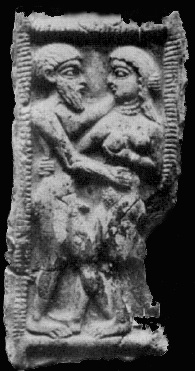Amanda's musings on earth-based spirituality, magic, North-American witchcraft, and contemporary Paganisms.
Friday, May 04, 2012
Inanna: Goddess of Love and Fertility
Today's post is brought to you by the letter "I" in the Pagan blog project. :)
Most of the time when I hear reference to the Goddess Inanna, it's in relation to Her descent into the underworld. Many a ritual and teaching curriculum has been built around this story, and rightfully so. It is a powerful myth rich in symbolism. However we often forget that Inanna is primarily a goddess of love, as well as fertility. "The descent" is only one of the many stories told about her.
In Sumerian, Inanna literally means "Queen of Heaven". She was the first daughter of the Moon God, Inanna, and the Moon Goddess, Ningal. As a goddess of love and the heavens, it's not surprising that she is also associated with the planet Venus--or the Morning and Evening Star. In her guise of Queen of the Earth, she was responsible for the fertility of the crops and humankind.
Lesser known than The Descent of Inanna, the hymn The Joy of Sumer tells of Inanna's descent from heaven and onto the earth to awaken the fertility of the plants and set into motion the annual cycle of life. This hymn, and the accompanying story, is particularly pertinent at this time of the year as it speaks to renewing the fertility of the earth. It is linked to the time of the year when the seeds are ready to be sown into the earth. In eastern Canada, that would be right about now, making it an interesting myth to work with around the time Beltaine.
Like many other myths associated with the fertility of the season, sex is involved. Inanna makes love with her lover, the King. Then Inanna and Dumuzi feast and celebrate among the people. Symbolically, this completes the marriage of heaven and earth, divine and mortal. It also reinforces the prosperity that Inanna offers the earth and her people.
Here is the Hymn:
The Joy of Sumer: The Sacred Marriage Rite
The people of Sumer assemble in the palace,
The house which guides the land.
The king builds a throne for the queen of the palace.
He sits beside her on the throne.
In order to care for the life of all the lands,
The exact first day of the month is closely examines,
And on the day of the disappearance of the moon,
On the day of the sleeping of the moon,
The me are perfectly carried out
So that the New Year’s Day, the day of rites,
May be properly determined,
And a sleeping place be set up for Inanna.
The people cleanse the rushes with sweet-smelling cedar oil,
They arrange the rushes for the bed.
They spread a bridal sheet over the bed.
A bridal sheet to rejoice the heart,
A bridal sheet to sweeten the loins,
A bridal sheet for Inanna and Dumuzi.
The queen bathes her holy loins,
Inanna bathes for the holy loins of Dumuzi,
She washes herself with soap.
She sprinkles sweet-smelling cedar oil on the ground.
The king goes with lifted head to the holy loins,
Dumuzi goes with lifted head to the holy loins of Inanna.
He lies down beside her on the bed.
Tenderly he caresses her, murmuring words of love:
"O my holy jewel! O my wondrous Inanna!"
After he enters her holy vulva, causing the queen to rejoice,
After he enters her holy vulva, causing Inanna to rejoice,
Inanna holds him to her and murmurs:
"O Dumuzi, you are truly my love."
The king bids the people enter the great hall.
The people bring food offerings and bowls.
They burn juniper resin, perform laving rites,
And pile up sweet-smelling incense.
The king embraces his beloved bride,
Dumuzi embraces Inanna.
Inanna, seated on the royal throne, shines like daylight.
The king, like the sun, shines radiantly by her side.
He arranges abundance, lushness, and plenty before her.
He assembles the people of Sumer.
The musicians play for the queen:
They play the loud instrument which drowns out the southern storm,
They play the sweet algar-instrument, the ornament of the palace,
They play the stringed instrument which brings joy to all people,
They play songs for Inanna to rejoice the heart.
The people spend the day in plenty.
The king stands before the assembly in great joy.
He hails Inanna with the praises of the gods and the assembly:
"Holy Priestess! Created with the heavens and earth,
Inanna, First Daughter of the Moon, Lady of the Evening!
I sing your praises."
My Lady looks in sweet wonder from heaven.
The people of Sumer parade before the holy Inanna.
The Lady Who Ascends into the Heavens, Inanna is radiant.
Mighty, majestic, radiant, and ever youthful --
To you Inanna, I sing!
~As translated by Diane Wolkstein and Samual Noah Kramer, (C)1983
Labels:
Miscellaneous,
mysterious ones,
Pagan blog project,
seasons,
spring
Subscribe to:
Post Comments (Atom)

No comments:
Post a Comment